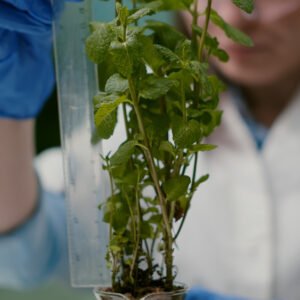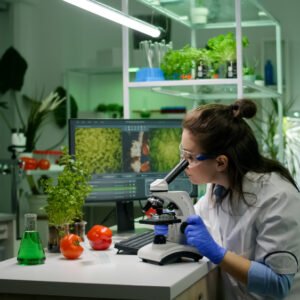Plant Ecology focuses on the interactions between plants and their environment. Students will examine plant communities, ecosystems, and the factors that influence plant distribution and abundance. Topics include plant adaptation to different environments, competition, symbiosis, and the impact of climate change on plant ecosystems. Fieldwork and ecological experiments will provide hands-on experience in studying plant-environment interactions and applying ecological principles to conservation and environmental management.
Plant Ecology
Related products
-
 Add to cart
Add to cartThis course covers the principles of plant genetics and the techniques used in plant breeding to improve crop varieties. Students will learn about genetic inheritance, DNA structure and function, gene expression, and genetic variation. The course also explores traditional and modern plant breeding methods, including hybridization, mutation breeding, molecular markers, and genetic engineering. Case studies…
-
 Add to cart
Add to cartEconomic Botany examines the economic importance of plants and their products. Students will study a wide range of plants that are essential to human life, including food crops, medicinal herbs, fiber plants, and timber. The course covers the cultivation, processing, and commercial use of these plants, as well as their role in different cultures and…
-
 Add to cart
Add to cartThis course explores the fascinating world of medicinal plants and their applications in natural and ayurvedic medicine. Students will learn about the historical and cultural significance of medicinal plants, the active compounds responsible for their therapeutic effects, and the scientific basis for their use. Topics include plant-based remedies for common ailments, the preparation and administration…
-
 Add to cart
Add to cartThis course focuses on the study of plant diseases, their causes, and methods for their control. Students will learn about the biology of plant pathogens, including fungi, bacteria, viruses, and nematodes. The course covers disease diagnosis, epidemiology, and integrated pest management strategies. Laboratory sessions will involve isolating and identifying pathogens, and fieldwork will include disease…
-
 Read more
Read moreThis course offers a comprehensive introduction to the field of plant botany. Students will explore the fundamental principles of plant biology, including plant structure, function, growth, and reproduction. Key topics include the major plant groups (algae, bryophytes, pteridophytes, gymnosperms, and angiosperms), plant morphology, and the basics of plant taxonomy. The course is designed for beginners…


